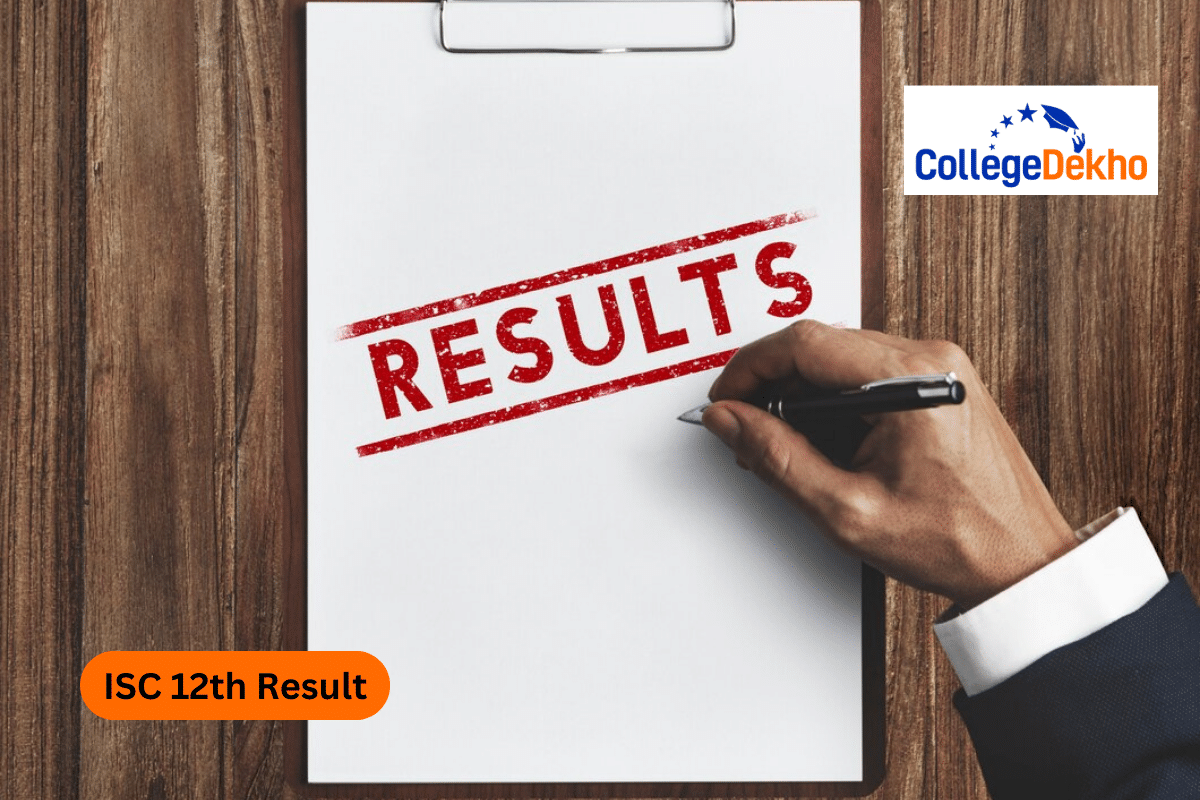

Never Miss an Exam Update
ISC Class 12 Sociology Syllabus 2024-25
will soon be released on the official website. The board provides the syllabus online to give students an idea about the chapters included. In total, there are 7 chapters in the syllabus. The students will have to appear for a theory exam of 70 marks. There will also be a practical exam of 30 marks. The
ISC 12th Board 2025
has included important topics in the syllabus such as Social Institutions, Religion and Society, Economic Organization, Political Organization, Tribal India, Social Stratification, and Social Change and Development. Each of the chapters further include a variety of topics.
ISC board is going to conduct the final exams in the month of February 2025. Students can read the article carefully to know the topics that are to be covered for the exam. Read in detail.
Also Read -
ISC 12th Exam Pattern 2025
ISC Class 12 Sociology Syllabus 2024-25 PDF
The sociology subject for ISC Class 12 is large and difficult. It includes a significant practical component that enables students to use their theoretical knowledge in actual situations. It covers a wide range of topics, from the fundamentals to the advanced. ISC Class 12 Sociology Syllabus 2023–24 PDF is available for download. The latest Sociology syllabus for the academic year 2024-25 will soon be provided online.Also Read - ISC 12th Time Table 2025
ISC Class 12 Sociology Syllabus 2024-25
Students can check the detailed syllabus for ISC Class 12 Sociology below.Chapter | Sections |
|---|---|
| Social Institutions | (i) Definition and features of Social Institutions. Self explanatory. (ii) Types of Social Institutions: Kinship, Marriage and Family The definition of kinship, Consanguineous and affinal kinship are two different types. Primary, secondary, and tertiary kinship; matrilineal and patrilineal descent; and matrilocal, patrilocal, and avunculocal residency Discuss kinship terminology that are used to describe and classify kinship, including avoidance, humorous relationships, teknonymy, avunculate, amitate, and couvade. Definition, merits, demerits, functions of the following: • Exogamy and endogamy (clan, gotra, pravara, village, and sapinda), parallel and cross cousins, levirate, sororate, hypergamy, and hypogamy are among the rules of marriage. • Polygamy (polyandry and polygyny), monogamy are two types of marriage. Family: definition and features (MacIver’s features); Functions of family to be discussed explaining the reasons for its universal existence. Types of family: consanguineous and conjugal family (family of origin and procreation), matriarchal and patriarchal family (matripotestal, patripotestal and avuncupotestal), nuclear and joint families. |
| Religion and Society | (i) The definition of religion and ideas of superstition, superstition, and taboo. Definitions and an introduction to each of the aforementioned concepts. Religion and science: their differences and similarities. (ii) Religious doctrines like totemism, animism, and naturism. A brief examination of functional theories (Malinowski, Radcliffe Brown, and Durkhiem) with animism, naturism, and totemism. iii) Functions and dysfunctions of religion. A brief discussion on the positive and negative functions of religion. (iv) Social control and morality. Relationship between religion, morality, and social control; definition of morality and social control; moral and religious codes. |
| Political Organization | Political structure and its function in bringing about social change. Discuss the 73rd Constitution Amendment Act, Bal Panchayats, the definition of a political organization, Panchayati Raj, and the role that each plays in the empowerment of women and children. |
| Economic Organization | (i) Economic Organisation Economic structure, economics, and free goods are defined. Food gathering, agriculture, shifting axe farming, handicrafts, pastoralism, and industrial labor are some of the Indian tribes' economies. Indian tribes' economies consist of: (i) food gathering; (ii) agriculture: shifting axe cultivation (jhum, dahi, koman, penda, podu, and bewar), criticism of this type of cultivation, examples of tribes engaging in this practice; (iii) handicraft making; (iv) pastoralism; and (v) industrial labor, which includes the migration of numerous Santhal, Kond, and Gond to tea gardens in the north-east; abundant (iii) Rural employment, the Jajmani system, and the agrarian economy. Land relations: owner, renter, and share cropper in an agrarian economy. Jajmani system: exchange of services and caste-based employment. A quick explanation of MGNREGA and its effects. (iv) Traditional Markets To be discussed with respect to Weekly markets, barter exchange. |
| Tribal India- Past, Present and Future | (i) Definition of tribe, features. Definition of a tribe and its characteristics, including its unity and self-sufficiency, clan and family, shared totemic ancestor, territory, occupation, endogamy, dormitories, language, common culture, common name, shared religion, political organization, and territory. (ii) Tribal Indian dormitories Definition; history of dormitories; characteristics and purposes; interaction and transformation of cultures in dormitories. (iii) Present conditions, problems and solutions. Conditions and issues in the areas of economics, politics (regionalism and separatist), social issues, and culture. Discuss the following government of India policies towards the advancement of the Indian tribes in brief (post-independence): Important constitutional protections for the tribal Panchsheel: key Committees and Commissions: Commission for Backward Classes; Special Central Assistance; Economic initiatives and resources: Large Sized Multi-Purpose Cooperative Societies (LAMPS), the 20 Point Programme, the Programme for Encouragement in Crafts, Home Industries, and Agriculture, and Educational Policies are some of the programs that promote rural development. |
| Social Stratification | (i) The components of social stratification. What social stratification, characteristics, inequality, and difference mean. (ii) Class: The nature, history, and several classes that make up the class system. Briefly describe the evolution and characteristics of the various classes (lower, middle, upper). (iii) Caste: Definition, history, comparison of castes and classes, and characteristics of the caste system. Definition, divine origin theory, and caste traits. Only definitions of social mobility, brahminization, and westernization are provided. (iv) Gender: The distinction between gender and sex, patriarchal ideology, and the position of women in independent India. The distinction between gender and sex, gender bias, and its effects on men and women in the workplace, on property rights, and in terms of family status. Gender-related problems include female infanticide, foeticide, dowry, sati, child marriage, domestic violence, rape, widowhood, and sexual harassment, as well as women who use violence as a form of self-defense. |
Social Change and Development | (i) Social Development and Change Social change and development definition: characteristics and sources. (ii) Developmental Elements Definitions and their impact on societal transformation of industrialization, urbanization, modernisation, globalization, and sustainable development. the connection between social change and development, with a focus on ecological and environmental challenges for enhancing both present and future generations' quality of life. (iii) Social movements: their objectives, causes, and social implications. (iv) Role of Education in creating Social change. The purpose and role of education. Insist on the importance of education in bringing about social transformation. To briefly examine the Right to Education (RTE) and its ramifications. (v) Role of Mass Media in creating Social change The function of mass media (print, electronic, and audiovisual; pros and cons of mass media). Knowing how each of the aforementioned mass media outlets contributes to social change and how to use them to build a civil society that challenges the bureaucracy and authoritarianism of the state apparatus through vigils, NGO activities, and actions like the Right to Information (RTI). |
ISC Class 12 Sociology Practical Work 2024-25
The details of practical work are added below.Project undertaken during the academic year at school level (15 Marks) |
|---|
|
1. Introduction -2 Marks
2. Statement of Purpose – 2 Marks 3. Research Question – 2 Marks 4. Methodology – 3 Marks 5. Data Analysis – 4 Marks 6. Conclusion – 2 Marks |
Viva – based on the project work ( 05 Marks) |
Benefits of ISC Class 12 Sociology Syllabus 2024-25
Knowing the syllabus beforehand helps students to prepare for the board exams in advance. This reduces the burden and last minute stress too. Let us take a look at the benefits of knowing the syllabus in advance.
Make a Wise Study Plan - Looking at the syllabus, students can know the names of chapters included. This makes it possible for students to divide the syllabus into smaller units and complete the parts in the fixed time limit. This will help them to complete the syllabus in advance.
In-depth Knowledge of the Syllabus - Through the syllabus, students will get in-depth knowledge of the chapters. They can go through all the topics in detail and get a clear understanding to write correct answers.
Discuss Doubts Timely - Students are suggested to go through the chapters done in the classroom. This helps students to figure out the topics that are not clear to them and they can directly discuss the doubts with teachers or peers.
Time for Revision -
When studying from the beginning, students get sufficient time for revision. After completing the syllabus, students can start solving the questions from sample papers and previous year question papers. This will help in testing the preparation level of students.
Also Read -
ISC Class 12 Previous Year Question Paper
ISC Class 12 Sociology Preparation Tips 2024-25
Following the preparation tips mentioned below, students can prepare well for the sociology subject. It will become easy for them to study all topics and improve their performance in board exams.
- Students should think analytically when studying Sociology.
- After reading the concepts, students should critically analyze the points.
- Mark the common questions asked in the exam and figure out which important points can be included to add value to the answer.
- Students should be ready to answer abstract theoretical concepts.
- Write the definitions in simple words in your own language. Focus on the meaning too. It should not get changed.
After completing the syllabus, students can start solving the previous year question papers which will further help them to understand the pattern and marking scheme of the subject.
FAQs
Students can score more than 95 marks in the ISC Class 12 Sociology Syllabus 2024-25 by regularly studying the syllabus. The students should also practice writing the answers. The familiarity with the questions will help students to write correct answers and score high marks in the board exams.
The students can go through the ISC Class 12 Psychology Syllabus 2024-25 to check the marks allotted to each of the chapters. This will help in recognizing the important chapter in the syllabus.
It is suggested to cover up the ISC Class 12 Psychology Syllabus 2024-25 from the starting. This will provide students sufficient time to do the revision.
Students can divide the ISC Class 12 Sociology Syllabus 2024-25 into smaller units. They can decide the time limit and complete the syllabus beforehand.
Was this article helpful?















